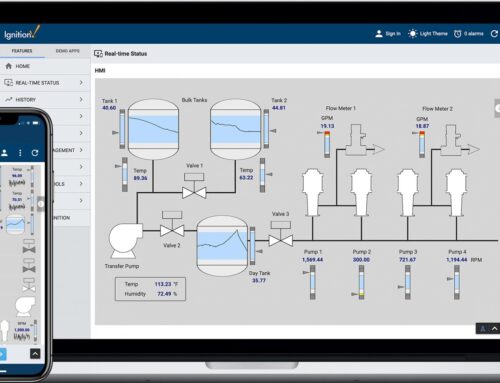In the ever-evolving landscape of food and beverage manufacturing,minimizing downtime and understanding its root causes are paramount for maintaining operational efficiency,ensuring product quality,and reducing costs. Automated downtime logging and root cause analysis have emerged as pivotal strategies in achieving these goals. By leveraging advanced technologies such as Ignition by Inductive Automation, food processing facilities can transform their data collection and analysis processes, leading to improved decision-making and enhanced overall performance.
In this article,we delve into the intricacies of automated downtime logging and root cause analysis tailored to food production lines. We will explore how these technologies work, highlighting key benefits and providing real-world examples to illustrate their impact. As a notable example:
- Impact of Downtime: Understand how automated systems considerably reduce downtime by providing real-time alerts and detailed logging that surpasses manual tracking methods.
- Data Accuracy and Consistency: Discover how automation ensures that downtime events are consistently recorded without the inaccuracies and omissions often associated with human logging.
- Root Cause Analysis: Learn how robust analytical tools help identify underlying causes of frequent stoppages, such as equipment malfunctions or process bottlenecks, enabling targeted remedial actions.
- Preventive Measures: See how predictive maintenance strategies are bolstered when automated systems offer predictive analytics to forecast potential failures before they occur.
- Case Study Insight: Gain insights from a case where a medium-sized beverage company implemented Ignition’s downtime tracking module, leading to a 30% reduction in unplanned downtime within six months.
Our objective is to provide a complete understanding of how automating downtime logging and root cause analysis not only enhances operational efficiency but also supports food safety and compliance objectives. This insight is invaluable for plant managers, engineers, and IT professionals in the food and beverage sector who are seeking to drive continuous enhancement and competitive advantage.
Understanding the Importance of Automated Downtime Logging in Food Production
Within the realm of food production, automated downtime logging stands as a crucial pillar supporting efficiency and maintaining the integrity of operations. By utilizing advanced technology solutions like Ignition, manufacturing teams can streamline the entire process of tracking equipment downtimes, thus minimizing the potential for human errors that often lead to extended downtimes or misreported incidents. As an example, through the use of real-time data analytics and IoT-enabled sensors, food production facilities can automatically record when a machine goes offline. This not only ensures that production managers are promptly notified of disruptions but also maintains an accurate log that can be utilized later for deeper analysis and optimization.
The strategic implementation of automated logging can reveal hidden patterns and trends in production lines,often unnoticed during manual tracking. Consider a high-paced dairy plant where frequent minor stoppages occur. With automated downtime logging, each stoppage is recorded along with contextual data such as temperature fluctuations, machine load, and operator interventions. As these data points accumulate, they provide invaluable insights for root cause analysis, helping identify whether issues are predominantly mechanical, environmental, or operational. This kind of information is paramount in reducing the frequency of incidents and enhancing overall plant safety through proactive maintenance and improved process design, ultimately contributing to a more robust production ecosystem.
Implementing Root Cause Analysis: Techniques and Tools for Enhanced Efficiency
In the realm of food line automation, the implementation of Root Cause Analysis (RCA) plays a pivotal role in increasing operational efficiency by systematically identifying and addressing the underlying causes of recurring production issues. One of the most efficient techniques in achieving this is through the deployment of automated downtime logging systems.These systems meticulously track and record downtime events in real-time,enabling operators to extract detailed insights without interrupting the production flow. Using sophisticated data analysis tools such as fault tree analysis or Pareto charts, production teams can easily visualize and comprehend data, shortening the gap between spotting an issue and solving it. For instance,if a specific filling machine unexpectedly stops multiple times during a shift,RCA can delve into potential causes such as equipment wear or operator errors,enabling preemptive maintenance or enhanced operator training.
To further support RCA, integrating Ignition SCADA with machine learning tools accelerates the identification process of potential failure points, achieving proactive problem control rather than reactive problem solving. Real-world examples, like the integration of sensors on a yogurt packaging line, underscore the method’s effectiveness. Sensors capture crucial metrics such as temperature fluctuations or vibrations that may lead to spoilage or machine breakdowns. Through comparative data analysis, patterns and anomalies can be detected indicating a need for immediate intervention. Techniques like the 5 Whys and Fishbone Diagrams are often employed to foster thorough insights, allowing teams to trace issues back to their source efficiently. Implementing these strategies not only enhances food safety and compliance but also ensures a higher throughput consistency, crucial for maintaining competitive advantage in food production.
Best Practices for Integrating Ignition Software in Downtime and RCA Systems
Employing Ignition Software to enhance your downtime and Root Cause Analysis (RCA) systems involves several key practices that can significantly improve operational efficiency. Firstly, ensure the seamless integration of Ignition with existing programmable logic controllers (PLCs) and supervisory control and data acquisition systems (SCADA) to automatically capture and log downtime events. This reduces the dependency on manual reporting, which is frequently enough susceptible to human error, and facilitates real-time data collection. For example, in a beverage production line, linking Ignition to sensors across various stages such as bottling, labeling, and packaging allows for a comprehensive view of potential inefficiencies.
To maximize the potential of RCA with Ignition, configure detailed event tracking and systematic tagging within the software. This allows your team to easily identify patterns and root causes of frequent downtime events. Use Ignition’s flexible scripting capabilities to create trigger-based alerts that notify maintenance teams immediately when specific conditions are met, thereby shortening reaction times. Real-world submission includes setting up alerts for temperature deviations in pasteurization systems or unexpected stoppages in conveyor belts. By maintaining a clear history of issue resolutions within the Ignition platform, operators can quickly reference past incidents, drawing insights that refine predictive maintenance strategies, ultimately bolstering the reliability and safety of food production lines.
Case Studies: Successful Reduction of Downtime and Enhanced Operational Insights
In the fast-paced world of food production, minimizing downtime is critical to maintaining both productivity and profitability.At Innorobix, we implemented automated downtime logging and root cause analysis across multiple food production lines using Ignition, achieving remarkable reductions in unplanned downtime. one of our standout projects involved a major dairy producer facing frequent production halts. By deploying real-time monitoring and alert systems, we enabled instant identification of downtime events, drastically improving response times. Such as, Ignition’s comprehensive data visualization tools allowed operators to pinpoint mechanical failures within minutes, reducing resolution time from several hours to under 30 minutes in critical cases.With intuitive dashboards, staff could easily track equipment performance, leading to a 20% increase in line efficiency within six months.
Implementing sophisticated root cause analysis tools allowed another client, a snack manufacturer, to gain significantly deeper insights into operational challenges.utilizing ignition’s historian capabilities, managers could access detailed logs that highlighted patterns in machine failures, giving them the possibility to address underlying issues before they resulted in costly downtime. This predictive approach, supported by automated alerts and reports, empowered the maintenance team to proactively conduct machinery checks and scheduled maintenance, cutting unexpected interruptions by 35%. Further advantages were realized through enhanced operator training programs, guided by insights derived from the automated system’s data. With intuitive, data-driven feedback, operators learned to anticipate and prevent potential failures, ultimately fostering a culture of continuous improvement.
Key Takeaways
implementing automated downtime logging and root cause analysis brings transformative efficiency and accuracy to food production lines. by eliminating manual entry and reducing human error,these systems provide real-time data that not only identify but also help preempt potential issues,ensuring minimal disruption to operations. the key takeaways from embracing such technology include:
- Enhanced Traceability: Automated systems offer comprehensive visibility into production processes, aiding in better decision-making and compliance adherence.
- Improved Safety Standards: By identifying root causes swiftly,operators can address underlying issues and maintain rigorous safety standards.
- Cost-Efficiency: Reducing downtime and minimizing waste translate to significant cost savings and improved yield efficiency.
Trust in the expertise and state-of-the-art solutions provided by Innorobix can guide your facility in achieving these benefits. We invite you to further explore how our automation solutions can optimize your operations. For a bespoke consultation or to schedule a demo, please do not hesitate to contact us. By harnessing cutting-edge technology, you’ll ensure your food line remains competitive, compliant, and safe.

















